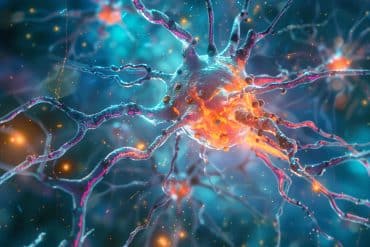Summary: Eating a diet high in vegetables can help reduce symptoms of fatigue in those with progressive multiple sclerosis.
Source: University at Buffalo
Higher levels of blood high-density lipoprotein (HDL) — or good cholesterol — may improve fatigue in multiple sclerosis patients, according to a new University at Buffalo-led study.
The pilot study, which investigated the effects of fat levels in blood on fatigue caused by multiple sclerosis, found that lowering total cholesterol also reduced exhaustion.
The results, published recently in PLOS ONE and led by Murali Ramanathan, Ph.D., professor in the UB School of Pharmacy and Pharmaceutical Sciences, highlight the impact that changes in diet could have on severe fatigue, which impacts the majority of those with multiple sclerosis.
Fatigue is a frequent and debilitating symptom for people with multiple sclerosis that affects quality of life and ability to work full time. Despite its prevalence and the severity of its impact, treatment options for fatigue are limited. The medications used to treat severe fatigue often come with unwanted side effects.
“Fatigue in people with multiple sclerosis has been viewed as a complex and difficult clinical problem with contributions from disability, depression and inflammation. Our study implicates lipids and fat metabolism in fatigue,” said Ramanathan.
“This is a novel finding that may open doors to new approaches for treating fatigue.”
In previous studies, Terry Wahls, MD, clinical professor of internal medicine and neurology and creator of the Wahls Protocol diet, and her team of researchers at the University of Iowa, showed that a diet-based intervention accompanied by exercise, stress reduction and neuromuscular electrical stimulation (NMES) is effective at lowering fatigue. However, the physiological changes underlying the improvements were unknown.
The researchers examined changes in body mass index (BMI), calories, total cholesterol, HDL, triglycerides, and low-density lipoprotein (LDL) — commonly known as bad cholesterol. Fatigue was measured on the Fatigue Severity Scale.

The study followed 18 progressive multiple sclerosis patients over the course of a year who were placed on the Wahls diet, which is high in fruits and vegetables. The diet encourages the consumption of meat, plant protein, fish oil and B vitamins. Gluten, dairy and eggs are excluded.
Participants also engaged in a home-based exercise program that included stretches and strength training, NMES to stimulate muscle contraction and movement, and meditation and self-massages for stress reduction. However, adherence to the diet was the main factor associated with reductions in fatigue.
“Higher levels of HDL had the greatest impact on fatigue,” said Ramanathan, “possibly because good cholesterol plays a critical role in muscle, stimulating glucose uptake and increasing respiration in cells to improve physical performance and muscle strength.”
Patients consumed fewer calories and experienced decreases in BMI and triglyceride and LDL levels as well. However, these factors were found unrelated to changes in fatigue.
The results provide the basis for a larger study that could examine the effects of metabolic changes on fatigue.
Source:
University at Buffalo
Media Contacts:
Marcene Robinson – University at Buffalo
Image Source:
The image is credited to University at Buffalo.
Original Research: Open access
“Lipid profile is associated with decreased fatigue in individuals with progressive multiple sclerosis following a diet-based intervention: Results from a pilot study”. Kelly Fellows Maxwell, Terry Wahls, Richard W. Browne, Linda Rubenstein, Babita Bisht, Catherine A. Chenard, Linda Snetselaar, Bianca Weinstock-Guttman, Murali Ramanathan.
PLOS ONE. doi:10.1371/journal.pone.0218075
Abstract
Lipid profile is associated with decreased fatigue in individuals with progressive multiple sclerosis following a diet-based intervention: Results from a pilot study
Purpose
To investigate associations between lipid profiles and fatigue in a cohort of progressive multiple sclerosis (MS) patients on a diet-based multimodal intervention.
Methods
This pilot study included 18 progressive MS patients who participated in a prospective longitudinal study of fatigue following a diet-based multimodal intervention that included exercise, neuromuscular electrical stimulation and stress reduction. The diet recommended high intake of vegetables and fruits, encouraged consumption of animal and plant protein and excluded foods with gluten-containing grains, dairy and eggs. Fatigue was measured on the Fatigue Severity Scale (FSS) at baseline and every 3 months for 12 months. A lipid profile consisting of high-density lipoprotein cholesterol (HDL-C), low-density lipoprotein cholesterol (LDL-C), total cholesterol (TC) and triglycerides (TG) was obtained on fasting blood samples at baseline and 12 months.
Results
FSS scores decreased from a baseline of 5.51 (95% CI: 4.86, 6.16) to a mean of 3.03 (95% CI: 2.23, 3.82) at 12 months (p < 0.001). At 12 months, increases in HDL-C (mean change: +6.0 mg/dl; 95% CI: 0.3, 12.0; p = 0.049) and decreases in BMI (mean change: -2.6 kg/m2; 95% CI: -3.6, -2.5; p < 0.001), LDL-C (mean change: -10.4 mg/dl; 95% CI:-19.7, -1.2; p = 0.029), TG (mean change: -29.2 mg/dl; 95% CI: -44.3, -14.2; p = 0.001), TG to HDL-C ratio (mean change: -0.6; 95% CI: -1.0, -0.3; p = 0.002) and TC to HDL-C ratio (mean change:-0.6; 95% CI: -1.0, -0.3; p = 0.003) were observed compared to baseline. Improvements in FSS were associated with increases in HDL-C (β = -0.05; 95% CI: -0.1, -0.0004; p = 0.048) and changes in TC (p = 0.005) from baseline to 12 months.
Conclusions
Lipid profile variables are associated with improvements in fatigue in progressive MS patients on a diet-based multimodal intervention.






